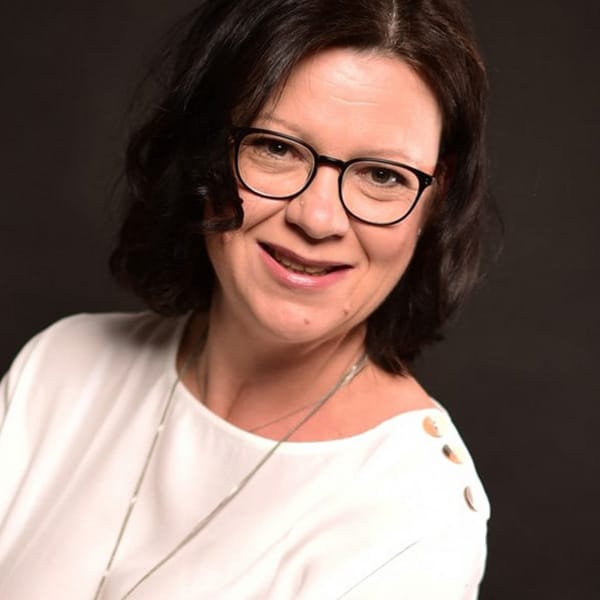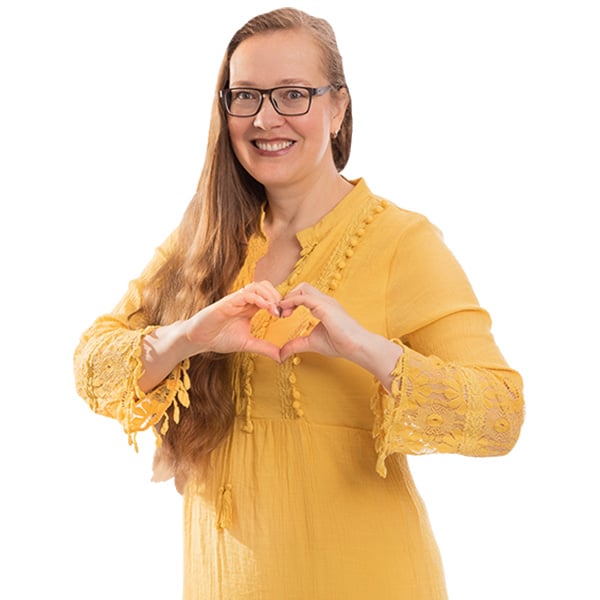by Nora Hille with Annett Lossack
Once upon a time, my happiness was louder. It broke spell as an unstoppable fit of giggles with the best friend during school lessons – I think we had physics. In no time we were standing outside the door, which did not diminish our happiness: We continued to giggle endlessly, tears running down our faces. We held our bellies, could hardly stand up straight, had to refrain from peeing. Breathless it was there, our happiness, free, loud and young.
World Day of Happiness: I listen to myself
Today is March 20, World Day of Happiness, and I realize: decades and umpteen strokes of fate later, my sense of happiness has changed. It is still part of me and can be felt every now and then – fortunately – but it has changed, become quieter and more conscious. So often coupled with other feelings like gratitude, friendship, love. And yes, above all, probably in satisfaction with my life. As if contentment were the little sister of happiness.
A quote comes to mind:
Happiness is self-sufficiency.
Aristotle
I’ve known this saying for a very long time and when I was younger I just thought “happiness and frugality? That sounds kind of really boring and like a ‘very little’?”
Happiness and self-sufficiency
Today I can understand the saying differently: “Happiness is self-sufficiency.” If I am satisfied with myself, if I am at peace with myself, then I can find happiness for myself and within myself – completely independent of external influences or conditions. An almost supernatural gift, this independent, sometimes quiet and yet so intense happiness.
“Happiness is self-sufficiency” means for me today that a search for happiness in the outside is not necessary at all, because everything I need to be happy I already carry within me, as well as the ability to be mindful, to perceive the little things. My inside so rich. But first I had to learn to be content with myself, and not to strive in a hurry in the outer world for everything that seems to promise happiness, such as recognition, fame, a great job, success, a love affair, beauty (if necessary through surgery), noble designer clothes, sex, money or even wealth.
Can happiness really be that simple, I ask myself?
Social aspects of happiness
There is something on the outside that can give us happiness or increase our inner happiness and I think that is true friends, possibly a partnership and in the best case a loving family. For it is not for nothing that we humans are social beings and often only recognize ourselves in exchange with others, whose presence and inspiration we enjoy, feeling happy at their side.
Happiness Atlas: Where are people happiest in Germany and worldwide?
Following the outbreak of the Corona crisis, life satisfaction among Germans has since risen again slightly to an average of 6.86 points in 2022 (10 is the highest score). Incidentally, Schleswig-Holstein is the most satisfied state in Germany with 7.14 points, followed by Bavaria with 7.06 points.[1] Last year, the World Happiness Report was also compiled for the 10th time. For this purpose, 146 countries are examined. Result: Finland, Denmark and Iceland are on the winner’s podium. Germany, however, has fallen sharply compared to the previous year, from 7th to 14th place, with Afghanistan in last place.[2] Germany is the most important country in the world.
My little quiet happiness
When I feel very closely, I recognize my small, quiet happiness in so many things:
- The touch of the wind on my skin, my face raised to the sky.
- The smell of freshly cut grass.
- Sun rays on my face.
- A soft melody.
- At a meal together with my family.
- At my husband’s side.
- When talking to a loved one on the phone.
- When putting my children to bed.
- In every embrace.
- When I can listen to a reading among like-minded people, let myself be touched by foreign words to the point of goose bumps.
- When petting my cats.
Let’s be mindful and grateful so that we can collect these small moments of happiness in our soul and thus strengthen our mental health.
Happiness trainer and coach Annett Lossack says:

“Oh, we already have a hard time with happiness linguistically. Anyone who speaks English reflects and decides in a matter of seconds whether they are lucky or happy. Either spontaneous random luck catches me right now or I dance in a joyous frenzy because everything is just right. In addition, other words can be found to describe feelings, for happy prospects of success or to tease out small and big risks in order to become happier. Our Danish neighbors, who predominantly describe themselves as happy and content and storm the happiness charts every year, live a ‘hyggelig’ feel-good happiness.”
Can happiness be researched? Between Freudian Desires and Seligman’s Emotions.
But now I would like to learn something about happiness research from the Happiness Trainer, a very exciting topic, I think. Annett Lossack comments: “While Freud equated happiness with the fulfillment of children’s wishes, today we tend to talk about the satisfaction of needs, the activation of the reward center and the release of happiness hormones. Martin Seligman[3], a founder of positive psychology (a branch of happiness research) also focuses on positive emotions. Personal strengths and virtues, in other words the character profile, allow these beneficial emotions to bubble up like a spring. Those who discover a meaning in what they do, can motivate themselves and celebrate small and large successes, are often at peace with themselves and the world. Structures and life plans that make a life worth living give us additional support and a framework.”
Doing, growing and unfolding: Flow …
“Mihaly Csikszentmihalyi, the father of flow, studied the beneficial feelings and positive effects when we are caught up in a mostly creative pursuit,” Annett Lossack continued. “In the process, we completely lose track of time and our surroundings and are amazed at how long we have been highly concentrated and productive. The basic recipe is based on a topic that fascinates me, an optimal level of demand that doesn’t over- or under-challenge me, a well-chosen portion of time, and an environment without disturbances, i.e. turning off the smartphone sometimes. Of course, it tastes even better when you individually select the ingredients from personal experience and trial and error according to your personal prerequisites and preferences, and add a chocolate chip as the icing on the cake. It can be uplifting favorite music or a steaming chai latte.”
… and the Broaden-and-Build Theory
“Barbara Fredrickson’s Broaden-and-Build Theory[4] compares personal development to the flourishing and blossoming of a water lily. Positive experiences in learning and unfolding increase self-efficacy and inspire optimism. Resilience is a good breeding ground for the seed of wisdom, which slowly matures, and for creativity. Since time immemorial, people have sought to understand what makes them happy, how individual well-being affects health, behavior and quality of life. I am pleased to observe that emotions have a different status today than they did at the beginning of the 20th century. Psychological and sociological aspects of increasing well-being were identified, which are now taught in happiness classes in some schools. With this, I associate the hope of sensitizing our children at an early age for a fulfilled life, to lovingly give them techniques and tools so that they and our society also become more mentally stable and healthy.”
Pros and cons – can you sabotage happiness yourself?
In our conversation, I learn from Annett Lossack that happiness research also addresses what makes this pleasant feeling impossible: “The American professor Raj Raghunathan is not only concerned with internal and external factors that nourish happiness, but also looks for obstacles to happiness. Well on the way to personal misery is who:
- stuck in lack, has too little attention, too little money and luxury, and also little questioning of personal values,
- is externally externally motivated,
- constantly controlled,
- has perfectionism breathing down your neck
- and dwells in the vale of tears, personal perception firmly focused on unfavorable external conditions.
A sure and well-tested path to unhappiness, according to Raj Raghunathan, is to know what makes me happy, but to boot confidently in another direction.”[5]
Say yes to happiness and just go
Now I would like to know: What can expert Annett Lossack advise us for more happiness in our everyday lives? “Our individual happiness is actually an active decision or attitude towards life and rarely happens all by itself. Whether we see or feel happiness with its many faces, whether our sense at the moment is for giving and making others happy or whether we just need something from the outside. The questioning, sensing and describing let the fog disappear and what is individually important for us emerge clearly. By getting to know, trying, discarding and practicing, we take responsibility for our well-being and personal growth and take care of our mental and physical health.”
I feel inspired. Thank you, Annett Lossack, for sharing your knowledge and all the valuable food for thought! Because I would like to think a little further at the end of the column….
Sometimes we have to free our inner happiness first

Yes, happiness is near and not impossible even in times of misfortune. Sometimes it is louder, sometimes quieter. Sometimes so hidden or buried that we first have to free it – first and foremost within ourselves.
I am sure: Even if you are mentally in an infinitely bad state right now and darkness envelops you (how well I know this state), somewhere it is already waiting for you, your gentle, quiet happiness. It exists. Despite all your suffering and mental pain. It is waiting for you and will not go away until you are ready to find it again and let it into your heart as a small, tender flame of encouragement.
Blossom, little happiness.
Blossom.
… and give confidence.
[1] SKL with the University of Freiburg: “Happiness Atlas 2022
Germany’s Happiness Level Recovering Only Slightly. ” https://www.skl-gluecksatlas.de/artikel/deutschlands-gluecksniveau-erholt-sich-nur-leicht.html (accessed March 15, 2023).
[2] World Happiness Report 2022: The Happiest Countries on Earth. Available online March 18, 2022, at https://happiness-report.s3.amazonaws.com/2023/WHR+23.pdf (accessed March 2023).[3] Seligman’s PERMA model combines the contributions of positive emotions, engagement, good relationships, meaning, and personal success on well-being. https://www.authentichappiness.sas.upenn.edu/learn or a post in German: https://karrierebibel.de/perma-modell/ (both sources accessed March 2023).
[4] https://www.dgpp-online.de/prof-dr-barbara-l-fredrickson (accessed March 2023).
[5] If you are smart, why aren’t you happy? | Raj Raghunathan | TEDxDelhi https://www.youtube.com/watch?v=KIp3rHn3PiI (accessed January 12, 2023).About the author
Nora Hille was born in 1975, is happily married and has two children. She studied history, literature and media studies, worked in communications/public relations for 12 years and has now retired for health reasons. Today she writes articles on the topics of mental health and mental illness as a sufferer and experience expert. She also writes literary essays, poems (preferably haikus) and short prose. She regularly publishes her mental health column here at FemalExperts Magazine and is Editor of eXperimenta - the magazine for literature, art and society. Anti-stigma work is close to her heart: she is an encourager at Mutmachleute e.V. and is committed to Anti-Stigma-Texts against the stigmatization (exclusion) of the mentally ill in our society for more togetherness, tolerance and equality. In autumn 2023 her book "When Light Defeats Darkness" will be published by Palomaa Publishing. A book of encouragement about how to live a good and rich life despite bipolar illness - and the enormous challenge that this means every day for the inner balance of those affected.
- 20. November 2022










